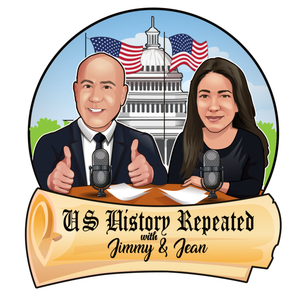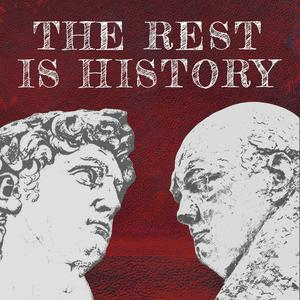
US History Repeated
Jimmy LaSalle & Jeananne Xenakis
Your Source for all things US History
- 13 minutes 28 secondsD-Day: The Allied Invasion at Normandy
This podcast covers the Allied invasion at Normandy. It was the largest and most complex amphibious invasion in history.
The actual date of the invasion was pushed back a number of times due to changes in the plan.
Hundreds of thousands of soldiers and a half a million military vehicles would need to be brought to the beaches at Normanday.
As early as the 1930s, the US military began looking for ways to safely bring troops from ships to beaches. A shipbuilder in New Orleans named Andrew Jackson Higgins modified one of his boats to meet the US military’s specifications. It became known as the Higgins boat. These boats were a game changer. It allowed Allied troops to get to shore. This is why the US WWII museum is located in New Orleans. The area became essential to the war industry and the success of the war.
We do not want to spoil the rest of the podcast in the description, so dig in and take a listen!
Jimmy & Jean
22 April 2024, 10:00 am - 36 minutes 24 secondsJapanese Incarceration Camps During World War Two - Part 3
Part three of our coverage of Japanese Internment during World War Two finds Jeananne continuing her interview with Angela Sutton, an Interpretative Ranger at Tule lake, one of the most infamous of the incarceration centers to get inside knowledge and more details of what went on in the camp.
We get many details and a few stories, including first hand accounts retold by Ms. Sutton, as well as descriptions of the camp itself.
Jeananne then goes into what happened to the detainees after the camps closed.
Japanese Americans were given $25 and a one-way train ticket to go and re-establish their lives.
A Supreme Court case which challenged the Constitutionality of Executive Order 9066 and Japanese Incarceration camps was Korematsu v The United States.
More than 40 years after the war’s end, President Ronald Reagan signed into law the Civil Liberties Act of 1988, which apologized to still-living Japanese Americans who had been held in the camps and ordered restitution of $20,000. In 1998, Fred Korematsu was awarded the Presidential Medal of Freedom by President Bill Clinton. After the terrorist attack on Sept. 11, 2001 when laws were passed that limited people’s civil liberties, once again Fred Korematsu spoke out. He died on March 30, 2005.
Listen to this podcast on how this went down and what exactly was involved.
There is always more to learn, talk to y'all soon!
Jimmy & Jean
8 April 2024, 10:00 am - 30 minutes 40 secondsJapanese Incarceration Camps During World War Two Part 2
Part two of our coverage of Japanese Internment during World War Two finds Jeananne interviewing Angela Sutton, an Interpretative Ranger at Tule lake, one of the most infamous of the incarceration centers to get inside knowledge and more details of what went on in the camp.
On January 14, 1942, FDR issued Executive Order 2537 which required non-U.S. citizens from World War II-enemy countries—Italy, Germany and Japan—to register with the United States Department of Justice.
They were then issued a Certificate of Identification for Aliens of Enemy Nationality.
Then came Executive Order 9066. This granted the secretary of war and his commanders the power “to prescribe military areas in such places and of such extent as he or the appropriate Military Commander may determine, from which any or all persons may be excluded.” There was no specific individuals or locations listed in the order. It was broad and left up to interpretation.
It was quickly applied to just about the entire Japanese American population on the West Coast. The War Relocation Board was created.
Listen to this podcast on how this went down and what exactly was involved.
There is always more to learn, talk to y'all soon!
Jimmy & Jean
25 March 2024, 10:00 am - 19 minutes 52 secondsJapanese Incarceration Camps During World War Two Part 1
After the attack on Pearl Harbor – political debate began about the need to protect the country against another attack from the Japanese, the fear of espionage, and racism all led to the eventual passage of a series of executive orders.
Prior to the forced removal from the West Coast, assets were frozen, and the FBI led by J. Edgar Hoover had compiled a list of about 1500 people of Japanese ancestry that the FBI believed needed to be watched. These individuals were arrested the day after the attack. Many of them remained detained for the duration of the war.
In addition, On January 14, 1942, FDR issued Executive Order 2537 which required non-U.S. citizens from World War II-enemy countries—Italy, Germany and Japan—to register with the United States Department of Justice.
They were then issued a Certificate of Identification for Aliens of Enemy Nationality.
Then came Executive Order 9066. This granted the secretary of war and his commanders the power “to prescribe military areas in such places and of such extent as he or the appropriate Military Commander may determine, from which any or all persons may be excluded.” There was no specific individuals or locations listed in the order. It was broad and left up to interpretation.
It was quickly applied to just about the entire Japanese American population on the West Coast. The War Relocation Board was created.
Listen to this podcast on how this went down and what exactly was involved.
There is always more to learn, talk to y'all soon!
Jimmy & Jean
11 March 2024, 10:00 am - 17 minutes 6 secondsPearl Harbor & The Entrance of the U.S. Into World War Two
Why did Japan attack the US at Pearl Harbor?
It’s important to first consider the history between Japan and the US.
Political relations between the two countries have a complicated past. Unlike it’s Pacific neighbor, China, Japan had been successful in isolating itself from the Western world.
Japan was building an empire and by 1905, they had just that.
With industrialization comes the need for resources in the form of raw materials.
A nation can get those resources via trade or by force. Japan had plans for the entire pacific and this was a threat to the U.S. interests in the region.
U.S. embargos and reluctance of U.S. banks to fund Japanese businesses caused great tension.
Listen to Jimmy & Jean and get all the details of what happened, why it happened, and how this began World War Two for the Unites States.
there is always more to learn,
Jimmy & Jean
26 February 2024, 11:00 am - 27 minutes 34 secondsWWII Part 1: European Theater
Today we begin our long anticipated coverage of World War Two. Now, this being a US History Podcast, we are not going to delve into the granular details of the beginnings of the war in Europe, but we do give a general sense of the goings on that began the conflict. We then really discuss the US Policy of neutrality at the time.
So, German blitzkreigs and expansion into neighboring lands, followed by heading into Poland, then France. Once Germany atatcks the Soviet Union though, they have to fight a war on two fronts.
Meanwhile US neutrality means zero involvement, then that evolves into becoming a supplier to The Allies. This manages to keep the US out of the war, at least for this podcast.
There is always more to learn,
Jimmy & Jean
#ww2
#wwii
12 February 2024, 11:00 am - 19 minutes 18 secondsEleanor Roosevelt
This is a USHR first with a podcast specifically on a First Lady. The longest sitting First Lady, Eleanor Roosevelt was very involved in her husband's presidency. We get into all of the below and then some.
She held regular press conferences as First Lady in The White House and only allowed female reporters as they were barred from the President’s press conferences.
Roosevelt began a syndicated newspaper column, called “My Day.”
She was a supporter of Civil Rights. In 1943, she joined the NAACP.
She Visited the troops overseas during WWII and would wear her red cross uniform.
In 1945, Eleanor Roosevelt was appointed by President Harry S. Truman to the first United Nations delegation, the only woman among the delegates.
There is always more to learn, talk to you soon!
-Jimmy and Jean
29 January 2024, 11:00 am - 38 minutes 34 secondsThe Presidency of Franklin D.Roosevelt Part 2
Part 2 of our coverage of the Presidency of Franklin D. Roosevelt (FDR) continues.
We continue the conversation between Jeananne and Jeffery Urbin of the Franklin D. Roosevelt Presidential Library and Museum.
There is always more to learn, talk to you soon!
Jimmy & Jean
#FDR
#NewDeal
15 January 2024, 11:00 am - 40 minutes 20 secondsThe New Deal
When FDR came into the presidency he promised to act swiftly in order to help the nation face the dark realities of the moment. FDR wasted no time in implementing his plan for economic recovery, which would come to be known as the New Deal. When we talk of the New Deal we often link it to the 3 Rs ( Relief, Reform & Recovery).
He implemented various programs, such as the Civilian Conservation Corps and the Federal Emergency Relief Administration, which aimed to create jobs and provide financial assistance to those struggling the most.
One of the most significant pieces of legislation passed during this time was the Glass-Steagall Act, which separated commercial and investment banking and aimed to prevent another stock market crash.Today we are joined by Neil Maher, a history professor at NJIT and author. He’s written multiple books but his book, Nature's New Deal: The Civilian Conservation Corps and the Roots of the American Environmental Movement is the focus of our discussion today.
Some of the other programs we discuss include:
Works Progress Administration (WPA)
Securities and Exchange Commission (SEC)
The FDIC
The Social Security Administration (SSA)
Tennessee Valley Authority (TVA)
National Industrial Recovery Act (NIRA)
Public Works Administration (PWA)
The Agricultural Adjustment Act (AAA)
That is a lot of letters and acronyms that Jeananne will get into!
Always more to learn...see you on the other side.
Jimmy & Jean
1 January 2024, 11:00 am - 34 minutes 56 secondsThe Presidency of Franklin D. Roosevelt Part 1
Franklin D. Roosevelt (FDR) was the longest sitting President of the United States. His Presidency was full of challenges, ranging from The Great Depression, up through most of World War II.
Our coverage of FDR will span a number of podcasts, and we summarize his presidency in two parts plus another sandwiched in the middle specific to "The New Deal"
Roosevelt will be prominent in the podcasts after that as we will be getting into the details surrounding WWII and delve into many of the events.
In the next few podcasts we have some guests. This podcast has Jeananne being joined by Jeffery Urbin of the Franklin D. Roosevelt Presidential Library and Museum.
There is always more to learn, talk to you soon!
Jimmy & Jean
18 December 2023, 11:00 am - 29 minutes 45 secondsAntisemitism in the U.S. & The U.S. Response To The Rise of Totalitarian Dictators in Europe
We are starting to build toward World War II and there are things happening both at home and abroad.
As this is a US History Podcast, we talk more to the way the US views the events occuring in Europe and the US policy of Neutrality.
We cover the US response to the rise of totalitarian dictators:
Adolf Hitler in Germany
Benito Mussolini in Italy
Francisco Franco in Spain
Then, we cover the rise in antisemitism both at home and abroad. The mass immigration and increasing population amidst the Great Depression begins to cause resentment at home, while there are much worse things happening over in Europe.
Let's leave the details to Jeananne in the podcast.
There is always more to learn, talk to you soon!
Jimmy & Jean
4 December 2023, 11:00 am - More Episodes? Get the App
Your feedback is valuable to us. Should you encounter any bugs, glitches, lack of functionality or other problems, please email us on [email protected] or join Moon.FM Telegram Group where you can talk directly to the dev team who are happy to answer any queries.
 This American President
This American President
 History That Doesn't Suck
History That Doesn't Suck
 The Rest Is History
The Rest Is History
 History Daily
History Daily
 American History Hit
American History Hit
 The Best of Car Talk
The Best of Car Talk